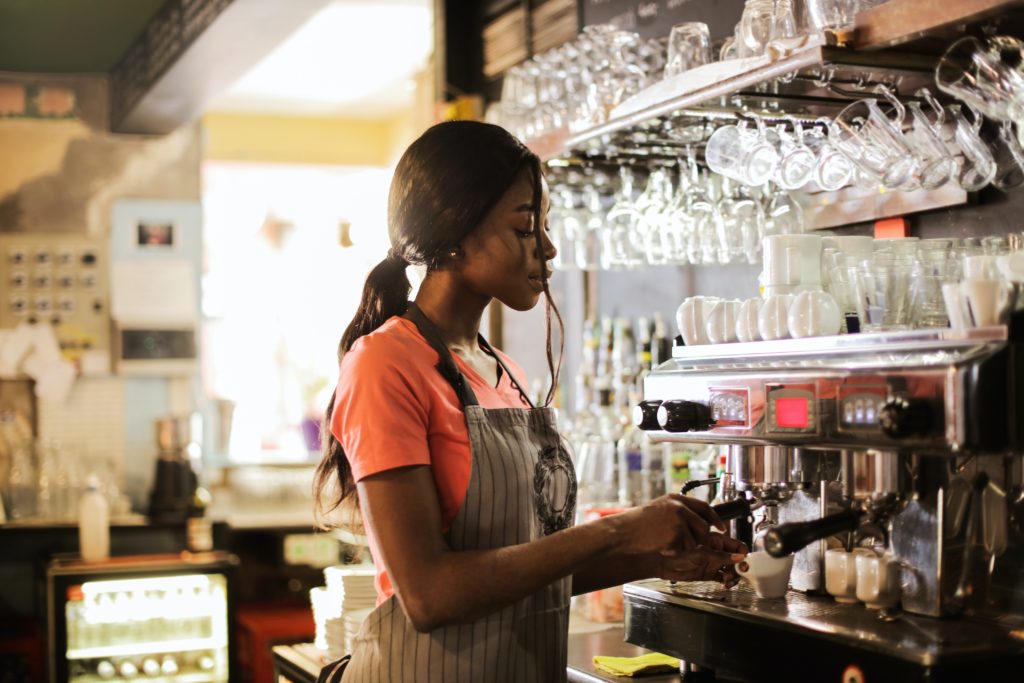Opening a coffee shop can be really exciting. Maybe you have always wanted to have a business, and you have decided that a coffee shop is a perfect fit for your skill set. You probably have all kinds of great ideas in your head about what you want your business to look like, what drinks you want to offer, and more.
One of the first things that you need to take into consideration before you start working on planning your coffee shop business is that you will need to get a business license. This is one of the earliest and most important steps for your business, and you need to be sure that you take care of this part of the process correctly.
You can end up losing a lot of time during the planning stages of your company just because of issues with your business license application. Taking care of this early on can make a big difference.
What do I Need to Know Before I Open a Coffee Shop?
The first thing that you need to be aware of is that your business license will not be the only license or permit that you will need to be able to open this kind of business. Some of the permits and licenses necessary vary per state. You will want to be sure that you do thorough research into all of the permitting and licensing details that are needed in your state before you start planning your shop’s opening day.
The business license process is fairly standard across the US. You can easily find the Secretary of State website for your state and look at the requirements that are listed on the website before you even have to apply.
In most cases, you will need to have a completed and thorough business plan which you can share with the state during the application process. This is a good place to start before you do anything else. This plan will help you to operate your business on a budget and with the right timeline, so you will benefit from its creation as well.
Make sure that you have decided upon a business type before you apply for your business license as well. Most coffee shops are run as LLCs, but you might have reasons to choose a corporation type for your company.
You might want to chat with a lawyer about this part of the process so that you get it right. It can be really tough to change these kinds of details later, and in some instances, you cannot reorganize your business once it has been registered as a certain type of company.
Once you know what your business type will be, you will need to be sure that you have an EIN so you can pay your taxes and pay employees. Also, be sure that you have checked that your proposed business name is free to be taken in your state.
This is a step that many people forget to look into and then have a bad shock when their business name has been taken. Branding is really important to a coffee shop company, so this is a part of the process that you need to really do your research on.
Once you have your business plan in hand and have an EIN, and a business type picked out, you will need to apply for a business license in your state. If you operate coffee shops in various states, you will need to complete the application process for a business license in each state.

A Business Plan is a Must
No matter how well you think you know the coffee shop industry or how clear your vision for your business is in your mind, you need to have a complete and thorough business plan. This paperwork is actually required in some states when you apply for your business license, and you will need to be sure that you have taken the time to look at all the costs and details of your business before you start applying for licenses.
Business plans also help you to be sure that you have enough money saved up or loaned to you so that you can get equipment and supplies, hire staff and get your permits and licenses in place.
Make sure that you also do a thorough survey of the competition in your market area. There are places that cannot actually provide enough business to a new store for it to be a success. You might not realize that this is the case until you do a market analysis.
This is one of the areas which is often neglected by new business owners, which can be the downfall of the business in the long run. No matter how much you like the idea of opening a business in a specific location, you need to be sure that there is room for another coffee place in that locale before you open your store.
The more detailed your business plan, the more useful it will be to you over the long haul. The goal is always to get your business to start turning a profit as soon as possible. When you have a complete and well-thought-out business plan in place, you can make sure that you are on target as your business grows and establishes itself.
Being able to follow the course that is already laid out in your business plan can help you to ensure that your business is a success and that it can thrive.
A business plan will include the following information:
1. Company Overview
This is a high-level explanation of the company. You might be focused on roasting your own coffee beans, or maybe you want to make drinks that are crafted with sustainable coffee products. There are many different ways that you might choose to brand your business and operate it. You will need to talk about the ownership structure, the customer experience, and the restaurant type in this section as well.
2. Team and Management
Talk about the size of the team that you will hire and how the management of the company will work. What kinds of drink methods are you going to use, and how will you outsource for food products and supplies? The management of your business can make or break it, so you need to be clear about everything from the development of new drinks to the expectations within each job role in this part of your business plan.
3. Sample Menu
This can be a good idea to make sure that you have a game plan for the first few months that your coffee shop is open. You will want to be sure that you have thought of the ingredients that you will need to make this menu possible, and it gives you a chance to think about some branding and other unique notes that you might want to put in place for your business.
4. Market Analysis
This is one of the most important parts of your business plan. You need to be sure that you are not going to put tons of time and money into opening a coffee shop only to find out that the market is saturated in your location and you cannot make your business a success. This is one of the parts of the business plan that should never be skipped over, and you will want to pay a lot of attention to this part of your planning process.

5. Marketing and Publicity
This part of your business plan has a lot to do with the funding of your business and branding your company. You will find that you will spend a lot of money in this space, even once your business is established, and you need to have a solid plan to make sure that your company can be discovered by clients.
Marketing and publicity can be handled in a variety of ways, and with a variety of budgets, so you should be sure that you make this part of your business plan, with details about how much you will spend and where the money will be spent.
6. Sales Forecasts and Operating Expenses
You might need to work with someone who has planned a business out before or a skilled lawyer to work through this part of the business plan. You need to be sure that you have a clear idea about the costs that you will incur as you open this business and the profits that you can expect to make to offset these costs. This is how you will determine if you need to take out a business loan or not, and it will tell you how long it will take for your business to be profitable.
7. Financing and Loans
Detailing your financing plans is as important as making sure that you have a good idea about when your company will be profitable. You will want to avoid loans and leases if possible. At a minimum, you will want to be sure that you do not have a large burden in debt that has been hanging over your business for years.
This part of the planning process can take some time to get right, so don’t rush through it in the business plan. You want to be sure that you will get the right funding in place so that profitability is just right around the corner.
Do I Need a Coffee Business License?
Coffee shops are food-handling businesses, so you will need to have a business license, but you will also need to make sure that the business is licensed and permitted to sell food products.
You will need to be sure that all of your staff has the correct food handling permits and training for your state of operations. These considerations are critical because businesses that are selling food without the right licenses in place can be shut down by the state health board.
You might also need to pay for and secure licenses to operate your business out of a food truck at varying locations or a permit to be able to place and operate your coffee stand in a parking lot.
Brick-and-mortar coffee shops will often have the most complex licensing and permitting that needs to be completed, and this can take months to get sorted out if you are not sure about the details. The location that you are operating in can make a big difference in the permissions and licenses for your business, and you need to be sure that you have a location picked out that you can reasonably afford and secure before you work on the rest of your permits and licenses.
Count on needing the following, no matter what state you are going to open your coffee shop in:

1. Business License
This allows the business to operate legally in the state, and it registers the business type as well. You will need this license to be able to keep your store open and pay taxes.
2. Retail Food Service License
This license is required for any business which sells food products. You will need to make sure that you also look into county-based retail food licenses and permits that you might need to have in place as well.
In many places, both state and county food handling licenses are needed. The type of business that you operate will impact the number of licenses that you will need. You also might have to have specialty food handling licenses or permits if you sell specific kinds of foods alongside your coffee.
3. Resale License for Sales Tax
There are very few states which do not have a sales tax, so you will need to be sure that you are filling out and applying for your sales tax license. This is an example form so that you can see what the application process will look like.
4. Permits for Signs
In many states and counties, signage for your business will require that you pay a fee. You might need a permit or a license for these signs, and you should be sure that you check on this before you assume that you can display a sign without paying anything to do so.
5. Food Handling Permits and Licenses
As mentioned earlier, the business itself will need food handling certification and permits to be in place and kept current. Everyone who works for your business will also need to have a food handlers license or permit that is current, or they will need to be sent home from work.
The health board in every state or county can do random checks of your operation to see if you are compliant with safe food handling laws. If anyone who is working for you does not have the right permits to be handling food, your coffee shop could be shut down and fined. You will want to avoid these issues by making sure that all of the food handling permits and licenses are current for your business at all times.

6. Building Health Permit
If you are opening a brick-and-mortar location, you will need to get a building health permit as well. This is standard for restaurant locations across the US, and this permit certifies that your business is in a sanitary condition. Without a building health permit, you will not be allowed to open your business, so this is a big factor for your brick-and-mortar location.
7. Liquor License
Most coffee shops will not need this license, but if you want to make fun spiked coffee drinks or you want to sell alcoholic beverages alongside your coffee offerings, you will have to have a liquor license. This is not negotiable, even if your business primarily sells coffee products.
Make sure that you are also aware of the legalities of server age-related to having alcohol in your store. Employees will need to be of age to serve alcoholic beverages, and they will need to have the right permits in place to be allowed to do so as well.
8. Entertainment Licensing
If you have a brick-and-mortar location that you are opening up, you might want to bring people in to buy coffee by offering live entertainment from time to time. This is something that also requires a permit, and you will need to look at the cost and the regulations per county in most cases if this is your plan.
You will find that entertainment licensing can vary widely based on your location, so you might need to budget quite a lot of cash for this particular license.
Other Considerations
If you are going to operate a coffee shop, you will, of course, have employees. This means that you will need to have worker’s compensation insurance in place to protect your workers if they are hurt while on the job. This can be costly, but you are typically required to have this kind of insurance in place before you can open your doors and serve customers.
You will also be required to have insurance in place for the business itself. This is to protect you from accidents that can happen on the property and from losses related to things like fires, acts of God, and more. While insurance can be really expensive and frustrating to pay for when you don’t need it, you will be grateful for it if something goes wrong for your business.
Make sure that you consider talking to a lawyer or an insurance expert about the kinds of insurance that you need to have in place for your business. The policy types that will cover you best can vary if you are operating a brick-and-mortar location or a coffee stand.
The number of employees will also impact the kind of insurance that you need to have in place for your coffee shop. Being sure that you have the right insurance policies in place is key to operating a successful business.
Always make sure that you check on the licenses and permits that might be required for your business at each of the various levels of government. You might find that you need to have a permit or license in place at the state level, the county level, or the federal level. The fines that can accompany missed permits and operate without a license can be quite steep, so getting this part of the process right is important.
Always be sure that you keep all of your licenses up to date as well. If you let these kinds of permits and permissions lapse, you can run into major trouble with your business. Sometimes businesses actually fail due to problems with licenses and permits. This is one of the key things that companies tend to forget to take care of properly, and you will want to avoid this common pitfall.

Coffee Shop Business Licenses Are Key to Opening Your Shop
If you have not already started to plan your business, make sure that you are working on your business plan and that a business license is at the top of your list of things to get in place for your new company. You will need to have this essential license in place before you can do much of anything else to get your business open and turn a profit.
There are many other permits and licenses that you might need as well, so do not overlook these added complications and considerations when you are planning your new business. You should never be afraid to work with a skilled business planner or a business lawyer to help you to get this part of your business plan in place correctly.
The more detailed and thorough you are in the planning stages of your business, the better off you will be when it comes time to execute your business plan. Business licenses are just one of the many things that you absolutely must have in place before you can open your own coffee shop.


